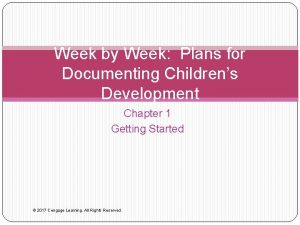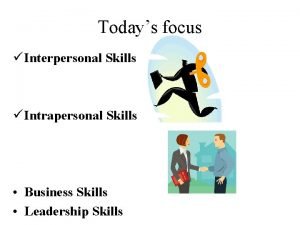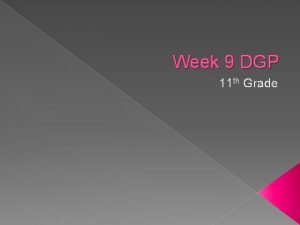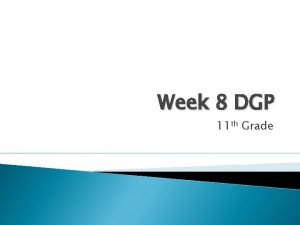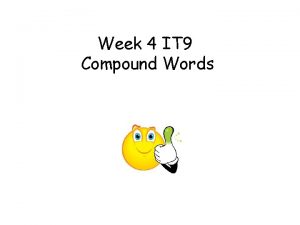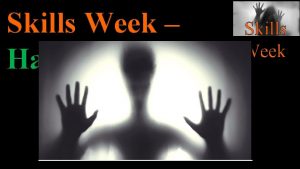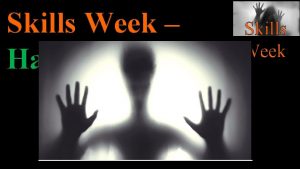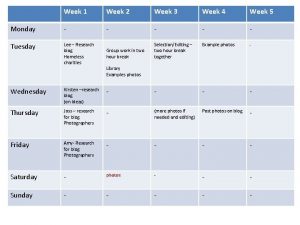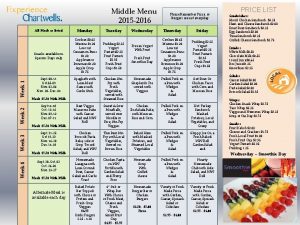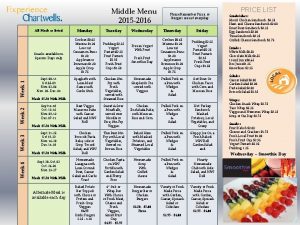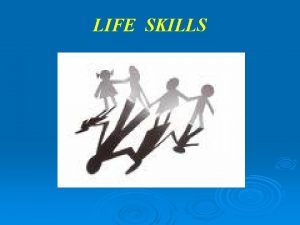Communication Skills Week 3 Communication Skills Communication skills










- Slides: 10

Communication Skills Week #3

Communication Skills • Communication skills are important to everyone - they are how we give and receive information and convey our ideas and opinions with those around us • Communication comes in many forms: • verbal (sounds, language, and tone of voice) • aural (listening and hearing) • non-verbal (facial expressions, body language, and posture) • written (journals, emails, blogs, and text messages) • visual (signs, symbols, and pictures)

Why is Communication Important? • It is important to develop a variety of skills for both communicating TO others and learning how to interpret the information received FROM others • Knowing our audience and understanding how they need to receive information is equally important as knowing ourselves • Communication skills are necessary for the development of self-advocacy and selfdetermination, important skills for lifelong success

Activity #1: Listen Hear! Everyone take a sheet of paper and listen to my directions very carefully. If I do a good job communicating, and you do a good job listening, all of our papers should look exactly the same. What was the result? Why?

Activity #1: Listen Hear! • Part of the communication process (and being a good communicator) is recognizing that people may need to receive information in different ways in order to be successful • Two-way communication (communicating well and good listening) is vital to effective communication at home, school, work, and with friends

Activity #2: Quit Talkin’: I Know What To Do I will pass out the papers face down. Please don’t look at them until I say Go! Read ALL of the directions before you begin. When I say go, you will have 3 minutes to read through the directions and get started.

Activity #2: Quit Talkin’: I Know What To Do • It is always important to understand what is expected of you before you begin a task • It is always important to know what the end result is supposed to be • How does this translate to school? To work? To home?

Journal Prompts 1. Describe how the first activity, listen hear, went. Was it easy or difficult? What made it easy or difficult? What would have been it more productive? Discuss any feelings and/or thoughts you had during or about the activity? How does this relate to effectively communicating as a leader? 2. Describe how the second activity went? Were you tricked? How did you feel at the end of the paper?

Journal Prompts 3. Think of a time when you could have been a better communicator or a better listener. Describe the situation. What happened? What is more important for a leader– communicating in a way that is easy for you or communicating in a way so that others can understand you? Is there a difference? Explain. 4. Give an example of a time when you really thought you knew what you were supposed to do but did not. What happened?

Journal Prompts 5. Why is understanding all kinds of communication (verbal, written and nonverbal) important for you to be aware of as a leader?
 Week by week plans for documenting children's development
Week by week plans for documenting children's development Inter and intra personal skills
Inter and intra personal skills Hard skill vs soft skill
Hard skill vs soft skill Ontario skills passport essential skills
Ontario skills passport essential skills Htcondor week
Htcondor week Htcondor vs slurm
Htcondor vs slurm Ana ascenção e silva
Ana ascenção e silva Dgp week 9 answers
Dgp week 9 answers The girl who sits behind rafael is a better student than i
The girl who sits behind rafael is a better student than i Compound words with coat
Compound words with coat Dgp week 16
Dgp week 16
